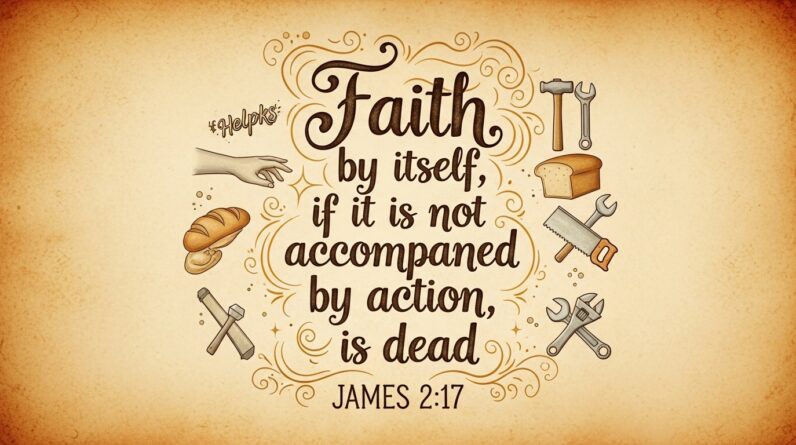How To Trust God When Life Doesn’t Make Sense
You wake up, you pray, and then life rearranges everything you thought was steady. You’re not alone. Feeling bewildered is part of being human, and sometimes the kindest thing someone can say is, “I don’t know either.” But as a follower of Jesus, you don’t have to be paralyzed by confusion. You can learn how to trust God when life doesn’t make sense. In this article you’ll find biblical examples, practical steps, and pastoral encouragement to help you keep walking even when the road is foggy and the map is missing.
You’ll see how Abraham’s long wait and Joseph’s brutal setbacks produce a pattern you can follow. You’ll learn spiritual disciplines that transform the way you respond to trouble. Above all, you’ll discover how trusting God in challenges becomes a muscle you can build—so you move from anxious reactivity to confident obedience.
Why Life Doesn’t Make Sense Sometimes
When your world falls apart, your first question is often “Why?” The Bible is honest about suffering and mystery. Bad things happen because of sin, free will, and a fallen world. Sometimes God allows hard things to shape you, and sometimes the reason just isn’t revealed yet. That ambiguity is painful, but it isn’t the end of the story.
What matters is not that you have all the answers, but that you have a faithful God. Scripture doesn’t remove the pain; it reorients your hope. The psalmist models this when he pours out confusion and ends in trust. You can bring your questions to God and still choose to put your weight on His character.
The Biblical Example of Abraham: Trust Through Waiting
Abraham’s life is the textbook of trusting God when timelines fail. God promised him descendants and a legacy long before the evidence existed. When God first called him, Abraham obeyed and left his country even though the destination was unclear (Genesis 12:1). Years later, God’s promise still hadn’t been fulfilled, yet Abraham believed God—and that faith was credited to him as righteousness (Genesis 15:6).
Abraham’s story teaches you the long obedience of faith. He experienced delays, missteps, and tests—most painfully the command to offer Isaac on the altar (Genesis 22:1-18). Even when a promise seemed to be ending, God was working. The lesson for you is not to pretend waiting is easy; it’s to remain obedient and expectant while you wait.
What Abraham’s Story Teaches You
Abraham’s life shows you three practical realities: God’s promises are not immediate but are ultimately trustworthy; faith is a choice you make daily; and tests are designed to refine, not ruin, your purpose. When you’re tempted to act in panic, Abraham’s pattern—listen, obey, and wait—offers a better map. The spiritual posture of trust requires patience and the willingness to step out when God calls, even without complete clarity.
The Biblical Example of Joseph: Trust Through Hardship
Joseph’s life reads like a novel of suffering that ends in salvation. Sold into slavery by his brothers, falsely accused, and imprisoned for years, Joseph faced one setback after another. Yet God was with him through every low and every reluctant high. In the end, what looked like catastrophic failure became the means by which God saved nations (Genesis 50:20).
Joseph didn’t understand the providence of God in the moment. He cried when he was betrayed and wondered why his life fell apart. But he refused bitterness and embraced integrity, and God used his faithfulness. Your trials may feel isolating, but Joseph’s life is a reminder that God can turn what is meant for harm into a platform for His purposes.
What Joseph’s Story Teaches You
From Joseph, you learn resilience, perspective, and grace. Resilience: Joseph kept serving even in the pit and the prison. Perspective: he could later say that what was meant for evil, God used for good. Grace: he forgave his brothers instead of retaliating. You can practice those same behaviors—serve faithfully, wait for God’s perspective to emerge, and extend grace—even when you don’t understand why things are happening.
Practical Steps to Strengthen Your Trust in God
Trust is not only felt; it’s formed. You increase your capacity to trust God through intentional practices. These steps aren’t theological theory; they are spiritual exercises that change what you believe by changing what you do. When you consistently practice them, you’ll find your faith becoming steadier even in the storm.
Step 1: Get Honest With God
God can handle your questions, anger, and doubts. The psalms are full of raw lament—David modelled how to bring confusion to God and still worship (Psalm 13:1-6). Transparency with God clears out the clutter that breeds fear. Talk to God about your hurts, ask the hard questions, and then listen. Prayer is not only for requests; it’s for relationships. When you’re honest, you open the door to God’s comfort and clarity.
Step 2: Anchor Your Hope in God’s Promises
Truths don’t feel true until you rehearse them. Anchor your heart in God’s promises and remind yourself daily. Verses like Romans 8:28 can become lifelines when you memorize and meditate on them: “Romans 8:28.” Those promises don’t remove difficulty, but they reframe your suffering as something God can redeem. Make a short list of promises and read them aloud when anxiety rises.
Step 3: Remember God’s Past Faithfulness
Memory defeats despair. When you remember how God met you in previous storms, you gain courage to face the current one. Scripture encourages you to “remember the deeds of the Lord” because the story of redemption is meant to strengthen you, not just to inform you (Psalm 77:11-12). Make a habit of recording answered prayers and times God intervened. When you’re tempted to give up, that list is a lighthouse.
Step 4: Immerse Yourself in Scripture
God speaks through His Word. Regularly reading Scripture changes your expectations and reshapes your mental habits. Hebrews 11, the chapter of faith, shows you dozens of men and women who trusted God without seeing the full outcome (Hebrews 11:1-40). When you study their stories, you learn practical patterns for trusting God in challenges. Scripture provides both promises and examples to follow.
Step 5: Surround Yourself with Faithful People
You weren’t designed to do this alone. Community sustains you when your faith falters. Find friends who will pray, listen, and speak truth into your life. In Acts, the early church shared burdens and prayed for one another; that rhythm empowered them to face persecution and uncertainty (Acts 2:42-47). Choose relationships that lift your eyes to God rather than feed your fears.
Step 6: Practice Obedience in Small Things
Trust grows through obedience. Start with simple acts: forgive someone, give time to help a neighbor, show kindness to a co-worker. Small obediences build a track record of faithfulness. Jesus taught that if you’re faithful in small things, God can entrust you with greater responsibility (Luke 16:10). Each time you choose obedience over fear, you strengthen your spiritual muscle for bigger trials.
Step 7: Choose Hope Over Despair
Hope is a decision as much as a feeling. Paul urges you to rejoice always and to pray continually, a posture that cultivates hope even in hardship (1 Thessalonians 5:16-18). When you practice gratitude and focus on God’s presence, hope becomes a habit. You can’t control outcomes, but you can choose to orient your heart toward the One who controls them.

How to Deal with Doubt and Fear
Doubt is not necessarily sin; it’s often the raw material God uses to mature faith. The disciples doubted, Thomas doubted, and even David had seasons of fear. The key is to move doubt toward honest seeking rather than secret despair. Ask questions, seek counsel, and return to the evidence of God’s character. Paul encouraged believers to take every anxious thought captive and bring it under Christ’s authority (2 Corinthians 10:5).
When fear hits, breathe, pray, and recite Scripture. The psalmist’s repeated command, “Be still, and know that I am God,” helps you slow down and center your thoughts on God’s sovereignty (Psalm 46:10). You don’t have to pretend you’re not afraid; you just don’t have to surrender to fear.
How Prayer Changes Your Perspective
Prayer is how you exchange worry for worship. It’s a practical way to hand your anxiety to God and ask Him to reframe your situation. Philippians tells you to present your requests to God with thanksgiving so His peace will guard your heart (Philippians 4:6-7). That peace doesn’t eliminate the problem, but it gives you the clarity and courage to act faithfully within it.
Prayer also aligns your will with God’s. In the Garden, Jesus modeled a surrendered prayer—“not my will, but Yours” (Luke 22:42). When you pray that way, you’re practicing trust even before you see results. Over time, prayer shapes your desires so that they match God’s purposes, and that alignment is a deep expression of trusting God in challenges.
How Waiting Strengthens Your Faith
Waiting is a furnace God often uses to purify faith. James says tests of faith produce perseverance, which leads to maturity (James 1:2-4). While waiting, you learn to depend less on your own schemes and more on God’s timing. The Israelites waited for the promised land; Abraham waited for an heir; Joseph waited in prison. Waiting is not wasted time when you let God use it to refine your character.
Use waiting to practice spiritual disciplines—prayer, Scripture, service—and you’ll find your faith becoming resilient. Replace the impulse to control with small acts of obedience and expect God to meet you there.
When You Don’t Understand God’s Timing
God’s timing often conflicts with your timetable. You want answers now; God operates in an eternal perspective. That doesn’t mean God is slow or absent; it means He sees the whole picture and you don’t. Isaiah reminds you that God’s ways and thoughts are higher than yours (Isaiah 55:8-9). Trust is choosing to believe His wisdom even when His timing is mysterious.
Ask God for patience, and ask Him to reveal one small next step you can take. Often, He won’t tell you the whole plan, but He will show you the next faithful thing. Take that step and trust that God is orchestrating the bigger outcome.
The Role of Worship and Gratitude
Worship is a corrective lens. When you sing truths about God, your heart is oriented away from fear and back to faith. The psalms show how worship and lament often live together; you can be honest about pain while still praising God’s character (Psalm 42:11). Gratitude rewires your brain to notice God’s provision even in the small things.
Make worship a daily discipline—sing, read psalms, and thank God for specific mercies. Those small acts change your inner climate and help you keep trusting God in challenges instead of succumbing to despair.
Trusting God in Challenges: Your Action Plan
You need a plan you can follow when confusion and fear threaten to take over. Here’s a simple, practical action plan to help you stay anchored:
- Get quiet and honest with God through a 10–15 minute prayer where you name your fears.
- Read one psalm—or a paragraph of narrative in Scripture—and look for one promise you can claim (Psalm 119:105).
- Write down one small obedient action you can take today that reflects your trust: a call, a visit, a kind word, or a step of service.
- Call or meet with a trusted friend and ask them to pray and hold you accountable.
- Record one way God used this hardship after it passes to remind yourself later.
This plan is not magic, but it’s practical. Each step trains your heart to choose trusting God in challenges and to respond with faith rather than fear.
Common Questions People Ask
You’ll have questions—and that’s okay. Here are answers to questions many believers wrestle with when life doesn’t make sense.
- Why didn’t God stop this? Sometimes, He allows things for reasons you cannot see. He promises He will work things together for good for those who love Him (Romans 8:28). Trust involves holding onto that promise even when the logic is missing.
- Is it wrong to be angry with God? No. Anger is an honest emotion. Biblical lament gives you permission to bring anger to God and stay in a relationship with Him afterward (Psalm 73:1).
- How long should I wait? There’s no fixed timetable. Continue to obey and pursue faithfulness while you wait. If your waiting leads you away from God, seek counsel and reorient to His promises.
How to Help Someone Else Who’s Struggling
When you see someone lost in confusion, your presence matters more than your advice. Listen, pray with them, and encourage small acts of obedience. Say things like, “I don’t have answers, but I will walk with you and pray.” Offer to read a psalm together, bring a meal, or simply sit in silence. Your supportive presence can be a lifeline. Encourage them to follow practical steps—prayer, Scripture, community—so they’re not isolated in their suffering.
Resources to Help You Grow in Trust
There are books, devotionals, and sermons that will strengthen your faith. Read biographies of faithful Christians who endured suffering, use daily devotionals that highlight Scripture, and find sermons that unpack God’s character. Online tools like Bible Gateway can help you look up promises quickly and meditate on passages that speak truth into confusion. Every resource is a tool to build your capacity for trusting God in challenges.
Trusting God in Challenges: A Few Scriptural Anchors
You need anchors—short, powerful verses you can return to when anxiety rises. Keep these on index cards or in your notes app:
- Proverbs 3:5-6 — Trust God with your whole heart.
- Romans 8:28 — God works for good.
- Psalm 46:10 — Be still and know God is sovereign.
- Hebrews 11:1 — Faith is assurance of things hoped for.
Rehearse them until they rise naturally in your mind when storms come. These anchors help you choose to trust God in challenges rather than surrender to panic.

Final Encouragement
You are not defined by your confusion or your unanswered questions. You are defined by the God who holds you. Trusting God in challenges is not an instant cure; it’s a spiritual journey that invites you to small, faithful steps day after day. Like Abraham, you can obey and wait. Like Joseph, you can keep serving and forgive later. Like the psalmist, you can lament and still choose praise.
When life doesn’t make sense, remember you have a God whose promises and presence outlast every storm. Practice honesty in prayer, immerse yourself in Scripture, build community, take small steps of obedience, and keep a list of God’s past faithfulness. Over time, you’ll find that trusting God in challenges becomes less of an abstract idea and more of a lived reality.
Explore More
For further reading and encouragement, check out these posts:
👉 7 Bible Verses About Faith in Hard Times
👉 Job’s Faith: What We Can Learn From His Trials
👉 How To Trust God When Everything Falls Apart
👉 Why God Allows Suffering – A Biblical Perspective
👉 Faith Over Fear: How To Stand Strong In Uncertain Seasons
👉 How To Encourage Someone Struggling With Their Faith
👉 5 Prayers for Strength When You’re Feeling Weak

📘 Jesus and the Woman Caught in Adultery – Grace and Mercy Over Judgement
A powerful retelling of John 8:1-11. This book brings to life the depth of forgiveness, mercy, and God’s unwavering love.
👉 Check it now on Amazon
As a ClickBank Affiliate, I earn from qualifying purchases.
Acknowledgment: All Bible verses referenced in this article were accessed via Bible Gateway (or Bible Hub).
“Want to explore more? Check out our latest post on Why Jesus? and discover the life-changing truth of the Gospel!”








